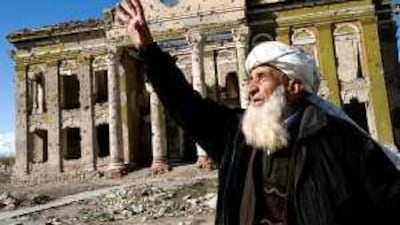KABUL // Afghans in Kabul see no realistic hope of peace on the horizon, with insurgents, the government and foreign troops all being blamed for the chaos enveloping the country. The international community may have billed 2009 as a pivotal year in the war, but few of the capital's residents expect violence to stop anytime soon given the current strategy being followed by the US and its allies. Instead, many are calling for an end to the occupation and demanding a greater emphasis on serious negotiations with rebel leaders, even though they believe such talks will probably fail.
"The best way to bring peace is for the Americans to leave the country. Right now you can see if an American vehicle passes here the soldiers will block the road. Why? They came to bring security for us but now they are just trying to make good security for themselves," said Fazel Mohammed, as he sold strawberries from a wooden cart. At least 17,000 extra US troops have begun deploying to Afghanistan and, after some political wrangling, presidential elections are scheduled to go ahead on Aug 20.
Yet for most people interviewed neither event appears to signify a positive turning point in a conflict that has been going on for almost eight years. Tiredness and a cynicism have set in among the city's population. "Both sides are to blame because they are killing each other, " said Haji Darab, a Turkmen. If recent weeks are anything to go by, it looks like violence could escalate far beyond the record levels it hit last year. In January and February, the number of American troop fatalities increased threefold compared with the same period in 2008. Meanwhile, according to the Associated Press, foreign soldiers were responsible for more civilian deaths in those first two months than the insurgents.
Although Washington and its allies are now scaling down their goals in Afghanistan, it is clear the military effort is still the main priority. However, rumours persist that diplomatic avenues are also being pursued in an attempt to divide the insurgency and bring some rebel commanders on side. Afghans interviewed by The National said a deal with the insurgents was the only way forward, but they were sceptical that any of the high-profile rebels wanted an end to the bloodshed.
"We need a government that should take care of the poor people and let us be free. It's OK if the Taliban want to join the government, but they are not human. They are wild and they will not accept that request," said Mr Darab, 70. As far as he is concerned, the two most prominent resistance leaders, Gulbuddin Hekmatyar and Mohammed Omar, should be excluded from any potential settlement. "[Mr Hekmatyar] is a very bad man and we don't want the government to give him a position.
"Both of them are the same. Mohammed Omar is the teacher and he is the student. There is no difference between the teacher and the student." Just across the Kabul River, there was also little optimism that peace will arrive soon in a land that has been in a state of constant war since the late 1970s. Asked if US and Nato soldiers should continue to stay, Sayed Ibrahim, a local resident, said: "The majority of Afghans don't like having foreigners in their country." He added that dialogue was necessary, although it probably would not be successful.
"I think if the government tries to arrest [Mr Hekmatyar] and put him in jail the people of Afghanistan will not be happy. He has lots of supporters and if they arrest him the situation will only get worse." Whenever the issue of a peace deal has been raised with any senior insurgents, they have always publicly rejected it out of hand until foreign troops are withdrawn. Eventually there may be a negotiated end to the unrest, but in the meantime the violence seems certain to escalate, with neither side backing down. In a sign of the spring and summer to come, Mr Omar has urged the Taliban in Afghanistan and Pakistan to concentrate on resisting the occupation here.
csands@thenational.ae

